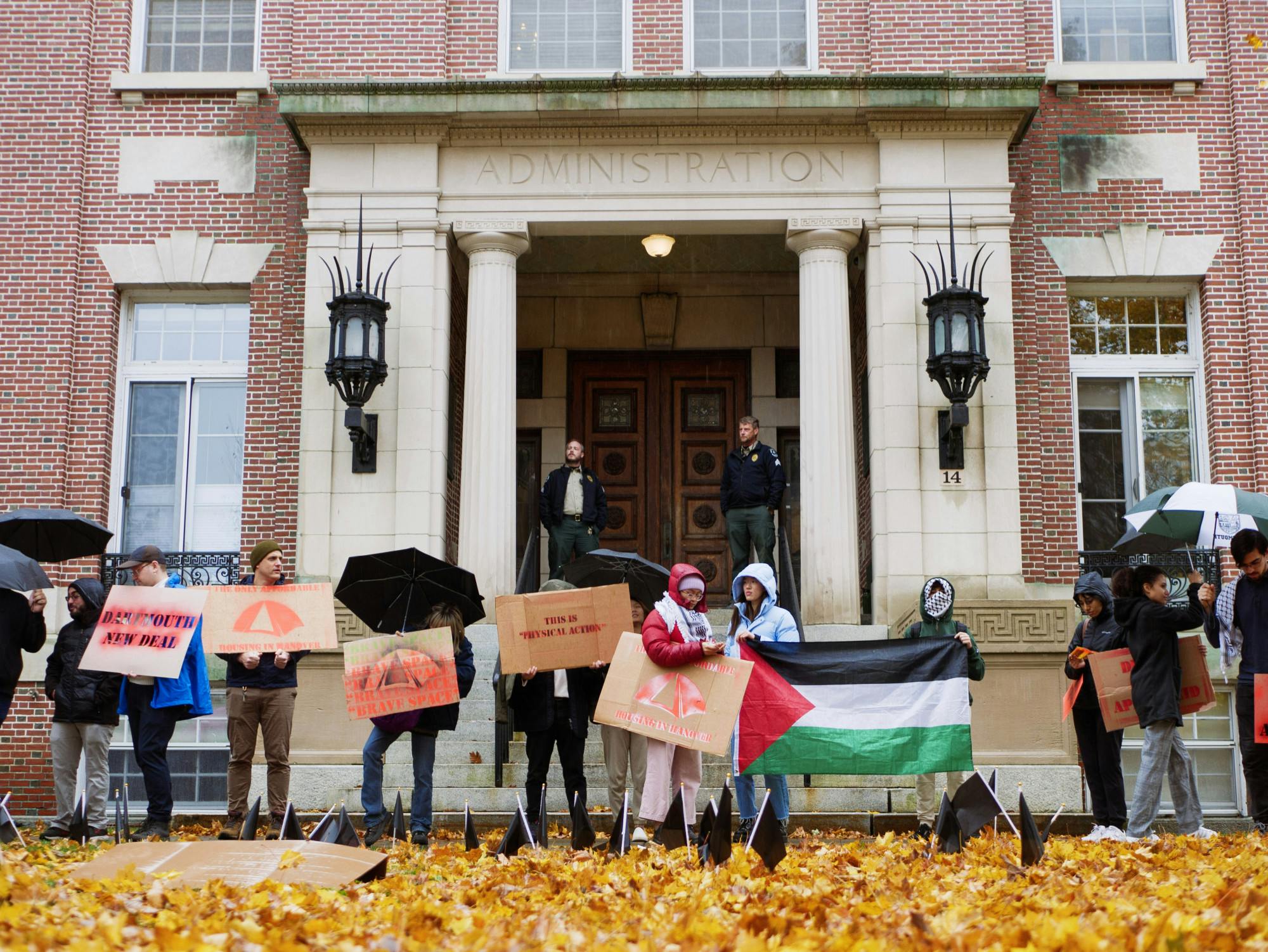The arrests of Roan V. Wade ’25 and Kevin Engel ’27 on Saturday, Oct. 28 outside Parkhurst Hall have sparked varying reactions across the student body, with some standing in support of and others voicing opposition to the administration’s actions.
The students were arrested on the grounds of violating the “Building and Facilities Policy” as well as the “Use of the College Green and Campus Grounds Policy,” amounting to criminal trespassing, according to an email to all students from Dartmouth Student Government on Oct. 28.
“We believe that the arrest of two peaceful students at 1 a.m was a needless escalation,” the email stated. “Such action threatens to suppress students’ freedom of expression and dissent on campus. We believe the administration should exercise better discretion when students engage in nonviolent civil disobedience.”
However, some students do not agree with the DSG’s portrayal of the arrests, believing that police intervention in the situation was warranted.
“My logic is that if you’re breaking a law, even if you’re not violent … I think you should be held accountable,” a member of the Class of 2025, who is Jewish and requested anonymity due to concerns for personal safety, said.
The administration tied the arrests to a “threat of ‘physical action,’” according to an email statement sent by College President Sian Leah Beilock the morning after the arrests. “College leadership spent more than six hours” attempting to de-escalate the situation before calling the Hanover Police Department, the email added. The discrepancies between these email statements from the College and DSG made the situation “unclear,” according to Benjamin Schirmeier ’27.
“What I found confusing about President Beilock’s email was whether the students were arrested for the threat of physical violence, for the violation of a campus policy or for a mixture of both,” Schirmeier said. “I would like a little bit more transparency about just exactly why they were arrested.”
Other students said that they believe that the College administration handled the situation properly, such as Minh Nguyen ’27.
“I feel like overall, [the administration has] done pretty well in keeping the campus a safe environment for the students to study and pursue their education,” Nguyen said. “[The administration] de-escalated and [came up with] a better solution with the students while also [keeping] us updated on the situation. I don’t think that our rights are being affected negatively.”
The association between the arrests and free speech on campus have generated a strong response from the student body. Since the protests were not “negatively impacting our community,” the arrests “did not make sense,” Adrien Jacobs ’27 said.
“It [would] be different if people felt unsafe, but [the protestors] were peacefully protesting — they weren’t damaging property,” Jacobs said. “What [the administration] has done in the situation is say freedom of speech on campus does exist, but if you say [certain things], you risk losing your freedom.”
In her email, Beilock emphasized Dartmouth’s commitment to free speech. Some students agree with her statement, arguing that the manner in which the protest was conducted may have crossed legal boundaries, and that students should exercise their free speech rights in a way that is not harmful.
“Especially in our community, we need to be careful about how we use [free speech],” the member of the Class of 2025 said. “We need to use it responsibly.”
Other students have reported that there is general confusion about where to place blame in this complex situation.
“I think that a misconception people have is that it’s somehow the police’s part,” Schirmeier said. “People are quick to cite the number of police there as a problem. In reality, I feel like they should be focusing more on the administration because Dartmouth has every right to call the police.”
After the arrests, students organized a demonstration on Monday, Oct. 30 to protest against the arrests and express support for the Dartmouth New Deal.
During the demonstration, protesters chanted: “From the river to the sea, Palestine will be free,” according to The Dartmouth’s past reporting. The use of this phrase has generated anxiety among the Jewish community on campus, according to the member of the Class of 2025.
“That’s hate speech — arguably, even violent speech,” she said.
According to the Guardian, Hamas included this phrase in their 2017 constitution. The member of the Class of 2025 said that the phrase has been used as a terrorist call for anti-Semitic violence, with “anti-Semitic people [trying to get] well-intentioned, left leaning college students swept up in the cause.”
“This, specifically, is highly charged,” the student said, adding that students without “the full picture” are being “very loud, even when they don’t seem to fully understand what they are saying.”




